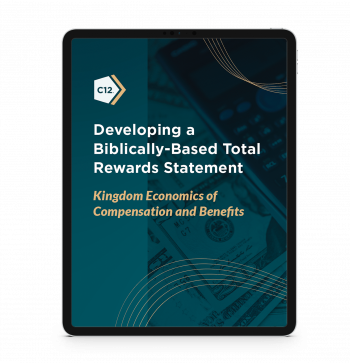Developing a Biblically-Based Compensation Strategy
A Christian Employer’s Guide to Aligning Pay Practices with Scripture
In today’s rapidly evolving job market, Christian employers face unique challenges and opportunities regarding pay and benefits. A recent study highlights that “employers are often out of touch with the needs of their employees, who seek higher compensation, better work-life balance, and quality benefits.” 80% of executives express difficulty adapting to these evolving demands. As a Christian employer, you can rely on the wisdom of God’s Word to develop a biblically-based compensation strategy that reflects the gospel and contributes to human flourishing.
What Does the Bible Say about Compensation?
Although the terms “compensation package” and “employee benefits strategies” are not explicitly mentioned in the Bible, biblical principles can still guide you in determining how to approach compensation:
- “For the Scripture says, ‘You shall not muzzle an ox when it treads out the grain,’ and, ‘The laborer deserves his wages.’” – 1 Timothy 5:18
- “Behold, the wages of the laborers who mowed your fields, which you kept back by fraud, are crying out against you, and the cries of the harvesters have reached the ears of the Lord of hosts.” – James 5:4
- “And remain in the same house, eating and drinking what they provide, for the laborer deserves his wages…” – Luke 10:7
- “Woe to him who builds his house by unrighteousness, and his upper rooms by injustice, who makes his neighbor serve him for nothing and does not give him his wages” – Jeremiah 22:13
The verses above underscore that God condemns wage withholding out of greed and emphasizes the importance of honoring workers by paying them what they deserve for their labor. However, this does not mean you should overextend yourself financially (James 5:4).
As Generation Z has entered the workforce in recent years, compensation expectations have significantly increased. A study conducted in 2022 revealed that recent college graduates overestimated their post-graduate salaries by approximately $50,000. This disparity illustrates the gap between what employees expect and what employers can realistically offer. As a Christian employer entrusted with financial resources, you have a responsibility to manage company resources responsibly to facilitate economic growth. At the same time, biblical stewardship demands that you compensate employees with a fair wage for their work. As the Bible says in Luke 10:7, “The laborer deserves his wages.”
God’s emphasis on justice is evident in the frequent use of the Hebrew word for justice, mishpatim, appearing 36 times in the Old Testament (Michael Zigarelli, Management by Proverbs: Scriptural Wisdom for Superior Results). In his book, Zigarelli suggests Christian employers align with God’s heart for justice by ensuring fair compensation. Fair compensation contributes to the flourishing of your employees’ financial and personal well-being.
Four Principles for a Biblically-Based Compensation Strategy
The following four principles form the basis of a biblically-based compensation strategy:
Fairness: Meet Employees Needs
The Bible emphasizes the importance of fair wages. Christian employers disregard God’s directives if they do not pay fairly. Therefore, thoroughly examining the concept of fairness in compensation is essential.
A team at MIT has developed a tool called the MIT living wage calculator to assist employers in determining a living wage for typical families in every county in the United States. This calculator estimates a living wage, poverty, and minimum wage in each region, considering factors such as marital status and the number of dependents. You can utilize this tool to estimate a living wage for your employees, but it is important to recognize that the results simply serve as a starting point. This calculator cannot accurately account for various factors, such as your company’s resources, industry, and location.
Your intentionality in developing a compensation strategy based on biblical principles reflects your commitment to truly loving your neighbor. Meeting this aspect of employee care requires you to learn and serve the unique needs of your employees.
Pay Equity: Strike the Balance
Pay equity refers to the concept of compensating employees who have similar job functions with comparably equal pay. This includes:
- External Pay Equity: Compares the pay within your business to the external market.
- Internal Pay Equity: Maintains consistent pay for employees in similar positions or with similar skill sets within the company.
- Geographic Pay Equity: Considers adjusting employees’ pay based on location. With the rise of remote work, this has become more relevant. It involves navigating complexities such as varying wage scales, local taxes, costs of living, and labor laws outside of the company’s region.
C12 member Leigh Culpepper is CEO of Culpepper and Associates, a compensation survey and consulting firm that helps businesses benchmark and design competitive and effective compensation programs. Leigh says Christian employers must learn to “strike the balance” between external and internal pay equity, exercising stewardship and analyzing objective data to be thoughtful on both sides.
Employers can respond consistently by developing an internal philosophy on pay, including pay grades, percentage of base versus variable pay, and where the company wants to target compensation packages compared to competitors. Benchmarking your numbers against other employers will give you insight into the market compensation for a given position, industry, and geography.

Abundance: Resist Fear
Employee compensation packages are often the biggest line item in a business’s budget. Due to their significant size, employers may experience fear and conflicting temptations regarding the impact of their decisions in this area.

The temptation to underpay may stem from fear of financial uncertainty. The temptation to overpay may come from fear of losing talent to competitors. Both temptations are based on fear. However, as a Christian employer, you must lean into the promises of Scripture that “God gave us a spirit not of fear but of power and love and self-control.” (2 Timothy 1:7). When you make pay decisions based on fear, you undermine your company’s future growth and success. Instead, Christian business leaders must approach pay decisions thoughtfully, trusting God to provide for the business without succumbing to fear.
Human Dignity: Hold Tightly to Values
Christian employers have faced increasing challenges with respect to government mandates for coverage of benefits that may not align with their biblical values. Examples include mandatory coverage of abortifacients and transgender reassignment surgeries.

Biblically-based compensation strategies will never violate Kingdom values and will fully align with God’s heart for people. It may be a surprise, but Christian-owned or Christian-led businesses can obtain exempt status from the requirement to cover some government mandates. The Christian Employers Alliance—a C12 BaaM Resource Organization—is a membership-based association that affords Christian employers exempt status.
Fair Pay: Performance-Based Compensation Packages
In his book Biblical Principles and Business: The Foundations, Richard Chewning emphasizes that pursuing excellence as a God-honoring attribute allows you to extend variable-based compensation according to each person’s abilities, efforts, and results, regardless of company hierarchy. This approach aligns with biblical principles and fosters a healthy work culture where employees are duly rewarded for their contributions.

Best Christian Workplaces, another C12 BaaM Resource Organization, lists “rewarding compensation” as one of eight factors contributing to a flourishing workplace. Employees must believe that their compensation is fair. The following compensation strategies increase employee productivity, decrease turnover, incentivize each person to utilize his or her talents fully, and reward each person when he or she helps the business do well:
- Performance-based bonuses
- Profit sharing
- Extra vacation time
- Employee Stock Ownership Plan (ESOP)
- Long-term incentives/phantom equity plans
Blessing Employees with Benefits: Employee Benefits Strategies
For many companies, benefits can be seen as a perfunctory afterthought. Benefits plans are often purchased “off the shelf” from benefits providers, and for most employers, the determining factor is cost. However, benefits are a key component of a biblically-based compensation strategy. With some creativity, benefits can be a powerful tool for employee satisfaction and fostering a strong company culture.
Go Beyond the Basics
Under the Affordable Care Act, employers with 50 or more full-time-equivalent employees must offer affordable minimum essential coverage to employees and their dependents. While providing only the bare minimum healthcare coverage may be tempting, crafting a benefits package that meets your employees’ needs and wants can significantly improve employee loyalty and morale. One best practice is to solicit employee input to determine which benefits matter most to employees.
Reflect the Company’s Core Values
For Christian employers, offering employee benefits based on the company’s core values can become a means to build a flourishing culture. Offering childcare and maternity/paternity leave benefits demonstrates the value of family. Offering gym memberships or counseling benefits demonstrates the value of physical and mental health. Offering classes on financial literacy demonstrates the value of stewardship. Employers may also consider offering paid time off to volunteer at a charity or for intentional rest and retreat. The possibilities are endless.
Get Creative
When you think creatively and consider the types of benefits that your employees genuinely appreciate, your benefits package begins to better reflect your company’s mission, vision, and values. C12 companies report a wide range of creative benefits, such as:
- Remote work environments
- Flex scheduling
- Responsible paid time off (RPTO)
- Floating holiday for birthdays
- Personal shoppers
- Trips and travel packages
- House-cleaning services
- Childcare and elder-care support services
- Enhanced mental health benefits for Christian counselors
- Marriage retreat sponsorships
- Kids’ summer camp sponsorships
- Time off for mission trips
- Access to a corporate chaplain
- Financial counseling through Financial Peace University
- Dream Manager programs
- Time off and financial assistance for fostering or adopting children
- Environmental perks in the office (food, fitness centers, learning spaces)
- Long-term incentives tied to company performance and value improvement
Total Rewards: Visualizing the Big Picture
Sometimes, employees underestimate the actual value of their employers’ compensation packages. Many payroll providers offer a “total rewards” statement to allow an employer to illustrate the “hidden paycheck” items that may not be as visible to employees.
Total rewards statements convey the total value of each employee’s compensation package, including pay, benefits, the value of paid time off, and employer contributions to employee retirement accounts. Presenting statements like these annually can be illuminating for employees. By offering your employees a comprehensive view of the big picture, you empower them to understand the full extent of your investment in them and how you genuinely care for their well-being.
To begin developing your total rewards strategy, download our free tool, Developing a Biblically-Based Total Rewards Statement.
Implementing Biblically-Based Compensation Strategies
David and Tanis Jamar are the leaders of J Bar Enterprises, LLC, a company specializing in portable sanitary restroom rentals. Their business often attracted individuals seeking entry-level positions, putting them in direct competition with the fast-food industry. When major fast-food chains increased wages, David and Tanis faced a challenge in staying competitive in the job market. Watch this video to see how David and Tanis identified the problem and developed a plan for change:
Compensation, Biblical Stewardship, and Human Flourishing
The Bible emphasizes the importance of justice and fair wages for workers, reflecting God’s deep care for these matters. His ideal workplace is one where employees are compensated fairly, feel valued and listened to, and finances are managed responsibly for advancing His Kingdom. You serve a God who blesses, holds you accountable, rewards, and invites you to reflect Kingdom principles in the business you lead.
Like all other business areas, your approach to compensation presents an opportunity to align company initiatives with God’s heart. When you strategically and creatively develop a compensation strategy that aligns with God’s heart for people, your workplace can become a vector for human flourishing as you build a great business for a greater purpose.
C12 Business Forums provides an architected environment for Christian business leaders that integrates work, life, and leadership transformation. To learn more about C12’s approach to Christ-centered business leadership, find a C12 Business Forum near you.
About the Author
C12 Editorial Team
C12 is the largest peer-learning organization for Christian CEOs, business owners, and executives and a leader in the marketplace ministry movement. Located in over 160 major metro areas across the United States, Brazil, Malaysia, Singapore, Taiwan, and South Africa, C12 serves businesses with 10 to 10,000+ employees and annual revenues ranging from $2 million to $5 billion. C12 Business Forums provides an architected environment for Christian business leaders that integrates work, life, and leadership transformation. Led by full-time C12 Chairs—veterans of business with ownership or C-Suite experience—our CEO and Key Player Forums equip members with resources and tools to steward a BaaM (Business as a Ministry) vision to build great businesses for a greater purpose. For more information, please visit C12 Business Forums.
June 14, 2024


